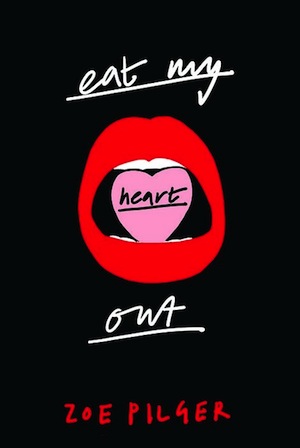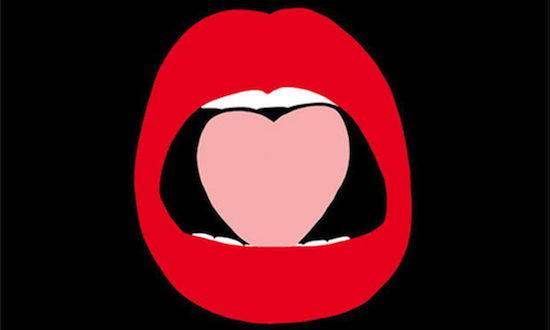There is a scene in the 1980s sitcom The Young Ones where Mike advises Rick, who has just delivered one of his characteristically ludicrous political rants, that ‘a social conscience is like a garden shed – if you try and eat it it’ll stick in your throat.’ The line is intended as pure gibberish (Mike often said, in a calmly authoritative voice, things that made absolutely no sense – that was his thing), but my younger self imbued it with a certain aphoristic wisdom, and I am reminded of it whenever I encounter a gratingly expulsive young idealist of the Rick type. Ann-Marie, the narrator-protagonist of Zoe Pilger’s debut novel, Eat My Heart Out, is not quite as hopeless as Rick – she is thoughtful, intelligent and smart – but she shares some of his erratic zeal and propensity for petulant rage.
Two-hundred-and-thirty-five pages into Eat My Heart Out we find our heroine masturbating with offal in the meat aisle in Tesco. She’s been going through a hard time and this moment is, perhaps, her nadir. Twenty-three-year-old Ann-Marie is a Cambridge graduate loitering around the London art scene, flitting between various low-paid jobs in the services industry. Recently jilted by the love of her young life, she has started afresh, attempting to steer a path between co-dependency and the cultish, misanthropic comforts of militant feminism. That ambivalence, and the journey of self-discovery towards its resolution, constitute the novel’s existential core; its flesh is a chaotic romp encompassing prolific dating, seedy liaisons with old men in hotels, drug-fuelled parties and castrations (actual and figurative).
Ann-Marie’s friends are an excruciatingly insufferable posse of privileged artsy types. Rampaging queens Freddie and Samuel might have come straight from the 2003 Michael Alig biopic Party Monster; except that, much to Freddie’s chagrin, they are not American but English. Freddie’s intermittent appropriations of Brooklyn slang, for which he is routinely ridiculed by Ann-Marie, are Pilger’s perceptive nod to the cultural chasm that separates the London hipster, clad in the cultural paraphernalia of NYC, from real-life Americana. We’ve all been there – that moment where you convince yourself your friends are dragging you down:
Freddie was smiling at his own reflection in the mirror; Samuel was looking with lovesick eyes at Freddie. I had to get away from these idiots.
Some hope of solace materialises when Ann-Marie strikes up a friendship with the renowned feminist academic firebrand Stephanie Haight, whom she idolises. But the promise is short-lived. Haight proposes to relieve Ann-Marie of her heartache by having her eschew love altogether, her eccentric misandry serving only to bear out the truth of the age-old dictum that you should never, ever meet your heroes. The first of several spectacular troughs in this ill-fated friendship sees an increasingly fraught Haight attempting to conduct a sort of exorcism on a perplexed Ann-Marie, performing a weird dance and calling on sprits to ‘Free this child from the spell of love cast by The Symbolic. Free her from the neo-liberal patriarchal web of incitements to fall in love.’ Yeah.
Pilger’s prose is at its best when at its least expansive. She is wry and taut in relating social banalities ranging from domestic emasculation (‘he had been ironing like a bitch when the phone rang’) to the application of prophylactics (‘I snapped one on his penis efficiently. It immediately began to die.’) But that spare register is not sustained throughout. The problem is, in a sense, that of Ann-Marie herself: how, as a writer, does one prevent a narrator-protagonist who (a) is very much off the rails, in that awkward phase between university and ‘real life’ and (b) has ingested a hell of a lot of Nietzsche and Heidegger, from doing too much of her thinking out loud, from wearing her politics too earnestly on her sleeve? In short, the faithful rendering of naivety becomes a problem of style. The result is a slight incongruousness in the texture of the prose, a stylised minimalism sitting uncomfortably alongside a plaintive excess of embedded philosophical exposition and soul-searching.
Rachel Kushner’s The Flamethrowers (2013) – which, like Pilger’s novel, tells the story of a woman in her early 20s negotiating the big city and its art world – achieves an altogether more subtle and textured elision of politics and storytelling. In contrast, Eat My Heart Out‘s political-existential preoccupations loom simply too large and unmediated for it to be substantially more than a fun and stimulating coming-of-age frolic. That said, it is a very different kind of novel to Kushner’s: a certain prickly, vaguely flippant insouciance gives Eat My Heart Out a distinctly satirical flavour, placing it in a separate tradition from the serious ‘literary’ novel as such. It works on its own terms – as a glib, deadpan comic jaunt.
Pilger is an art critic at The Independent, and art features prominently in the novel, in both background and foreground – whether it’s the over-priced, meretricious junk being peddled by art-world wannabes at lavishly pretentious industry gatherings, or the appearance of a print of Goya’s Saturn Devouring his Son, glaring in its Oedipal symbolism, on her ex-boyfriend’s bedroom wall. The most apposite cultural reference in the book is also the most obscure: a fleeting cameo from noughties electro-pop outfit No Bra, whose 2005 song ‘Munchausen’ comprised an exchange of satirically absurd boasts between two hipsters, set against a simple, monotonous electronic beat. The disparate hotchpotch of cultural allusions crammed into just under 300 pages of fast-moving prose reflects, in some measure, the scattergun dynamic of intellectual engagement in one’s early 20s. Like youth itself, this novel’s frenetic exuberance is both a strength and a weakness. Eat My Heart Out lacks the finesse and roundedness of a more mature work; it is nonetheless a spirited and accomplished debut.

Zoe Pilger’s Eat My Heart Out is available now, published by Serpent’s Tail. It featured as one of Stuart Hammond’s choices in our picks of 2013 & ’14


